Iranian Writers’ Association Vows To Strive For Freedom Of Expression
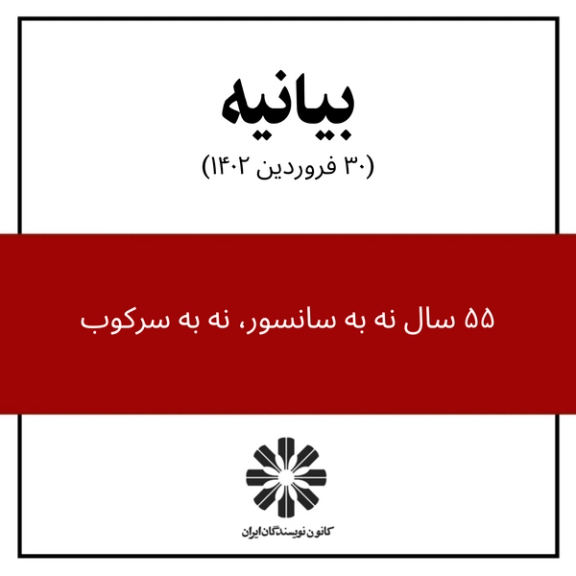
The Iranian Writers’ Association has marked its 55th anniversary by renewing its commitment to freedom of expression in the Islamic Republic.

The Iranian Writers’ Association has marked its 55th anniversary by renewing its commitment to freedom of expression in the Islamic Republic.
In a statement, the association said, "Freedom of expression is the gateway to other freedoms, and hope for change does not fit within the framework of tyranny.
"We are celebrating the 55th anniversary of the establishment of the Iranian Writers' Association in a situation that the regime has spilled the blood of countless freedom-seekers and protesters, executed some, and jailed many in prisons."
The association recalled how last year, hours after the murder of 22-year-old Mahsa Amini in police custody, it openly expressed solidarity with the freedom movement of the Iranian people.
The public stance in defiance of the authoritarian regime’s crackdown and crimes has led to the widespread suppression of the Iranian Writers Association, reads the statement.
But the association vowed that the brutal repression will not stop their quest for freedom.
The Iranian regime increased the number of arrests of prominent writers and other artists after popular antigovernment protests broke out in September 2022.
According to PEN America’s 2021 Freedom to Write Index, Iran jailed the fourth-highest number of writers and public intellectuals in the world. In 2022, arrests of writers and other artists have spiked dramatically.
A prominent member of the Writers Association, Reza Khandan Mahabadi, was released in February after months of detention.
He wrote on his Facebook page after his release that the Iranian regime’s suppression of protests added to people's grief, but “it could not put the genie back into the bottle.”
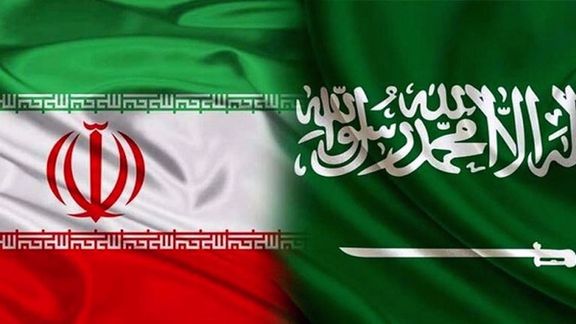
Saudi Arabia has far greater approval ratings than Iran in other Muslim countries across the region, analysis by Gallup reveals.
According to the research conducted in 2022 across 13 Muslim-majority countries by the US-based pollsters, Saudi Arabia's leadership received the approval of 39% of those surveyed, against just 14% for Iran.
The Kingdom showed sharply higher support still both in Kuwait, where a 47%-point approval difference illustrates close ties between Gulf Cooperation Council countries and OPEC partners, and also Libya, where Saudi Arabia enjoys a 41-point advantage in popularity.
Saudi Arabia has greater popularity in all countries polled, stretching from Morocco to Pakistan. The difference is most muted in Turkey, where the advantage is just three points.
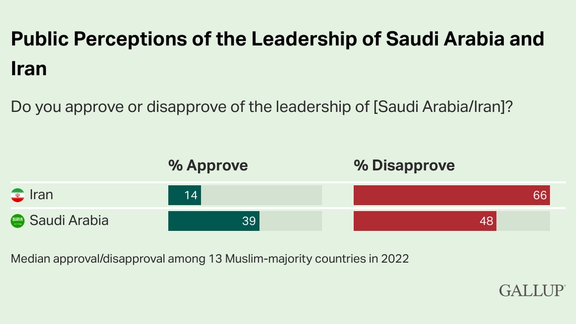
There is a relatively small approval gap in the Palestinian Territories of 12 points, but still Saudi Arabia is more popular there despite Iran’s all-out support for the resistance groups.
Most countries where Iran has had the greatest influence give Tehran low marks, including Iraq (86% disapproval), Yemen (80%) and Lebanon (73%).
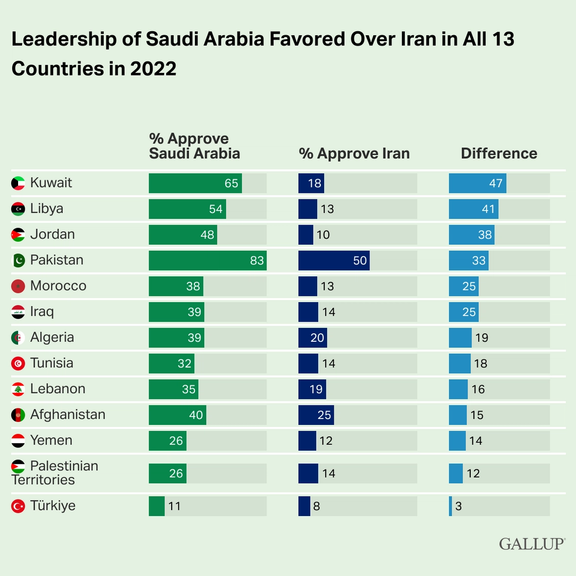
After the 1979 revolution, the theocratic government of Iran quickly formed enemies throughout the Middle East when it demanded overthrow of Gulf monarchies and secular Arab governments. The Islamic Republic’s support for Shia minorities in Sunni-majority countries placed it at odds with the countries in the Middle East.
After seven years of hostility that fueled conflicts across the Middle East, Tehran and Riyadh agreed to end their diplomatic rift and reopen their diplomatic missions in March.
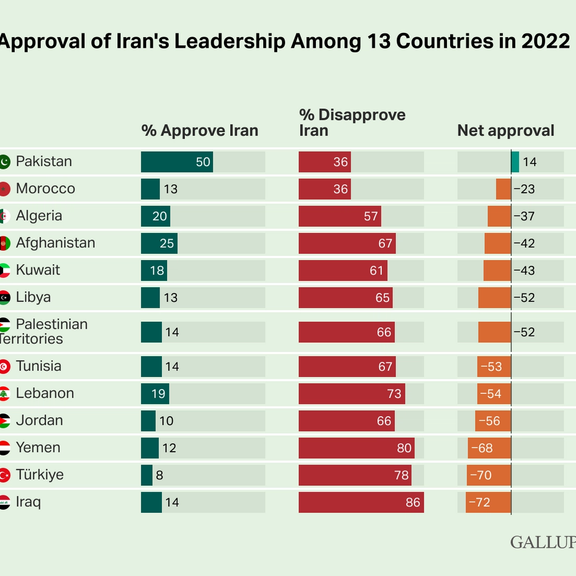
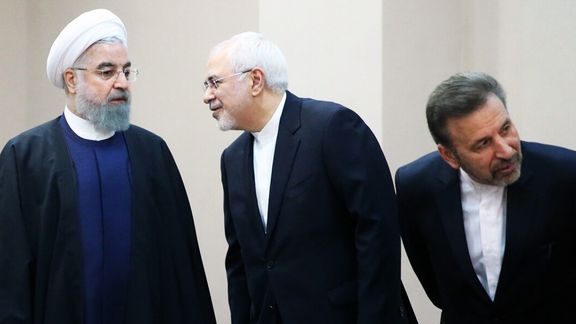
Former President Hassan Rouhani says Iran’s current nuclear negotiators unsuccessfully demanded compensation from the United States to claim an “achievement.”
The claim was made in an article published on Rouhani’s personal website Monday which also refuted that he had opposed seeking damages as a result of Donald Trump’s sanctions.
Rouhani’s hardliner opponents charged in March that the former president opposed demanding compensation from the US during talks to revive the 2015 nuclear deal, officially known as the Joint Comprehensive Plan of Action (JCPOA).
Rouhani’s website alleged that the administration of President Ebrahim Raisi included the issue of compensation on the agenda of the talks in Vienna “as a new demand" or “possibly to claim [an extra] achievement for itself,” if it was accepted.
“The claim that Dr. Rouhani opposed seeking compensation from the US was made by the negotiating team’s media advisor [Mohammad Marandi] after the failure to include the topic in [the agenda of] talks or in the draft of the agreement,” the article said.
In late March in a video interview with London-based pro-regime activist Ali Alizadeh, Marandi claimed that Rouhani’s foreign minister, Mohammad-Javad Zarif,
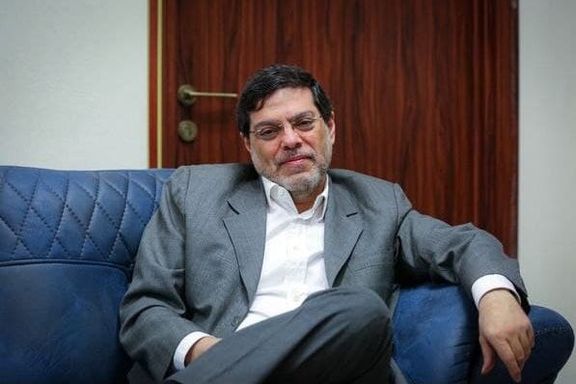
had suggested to Rouhani that Iran should seek compensation but Rouhani opposed the suggestion and Zarif was offended.
“I personally, and others, told Dr. Zarif that we must ask the US for compensation. This does not mean the US would [actually] pay compensation. You say you should pay compensation so that you can score points elsewhere. Zarif did that but Mr. Rouhani said in a cabinet meeting that this was not required,” Marandi said, adding that Zarif told him his hands were tied because Rouhani was opposed to it.
A few days later, the reformist Jamaran News claimed that a “former member of the negotiation team” has denied any discussion of the payment of compensation between Zarif and Marandi.
“The former member of the negotiation team said seeking compensation from the US for withdrawing from the JCPOA was a failed plan by the current team which they are trying to blame the previous administration for,” Jamaran wrote.
“We don’t currently intend to speak about the damages we have incurred. Authorities of the country will follow up on that at its appropriate time,” Rouhani’s website quoted him as saying at a cabinet meeting on March 24 2021.
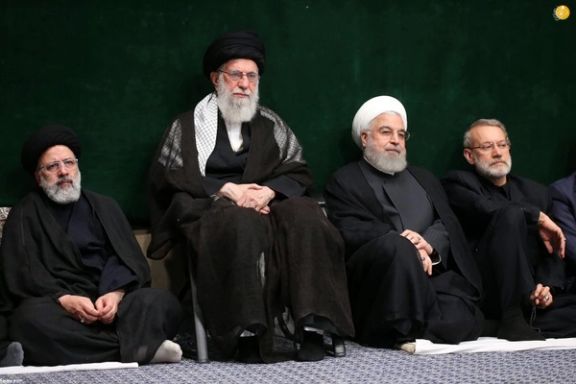
It also pointed out that this was “a repetition” of Khamenei’s own remarks in a speech on January 9, 2021 in which he said the United States’ return to the deal would only be meaningful if sanctions were lifted. “Albeit there is the issue of compensation which is among our demands and will be followed up in later stages,” Khamenei said in the same speech.
Rouhani’s website also quoted Zarif’s speech at the Mediterranean Dialogues Conference in July 2020 in which he mentioned the issue of compensation and again in February 2021 when he said in an interview with CNN’s Farid Zakaria that payment of compensation had never been a precondition for the talks but would be discussed after the restoration of the deal and the return of the US to it.
“The said stances prove that what Rouhani said in March 2021 corresponded to the stance of the Supreme Leader of the Revolution … Compensation meant seeking payment from the US for damages [incurred by Iran] following Donald Trump’s withdrawal from the JCPOA. [It was] not a precondition for negotiations with the 5+1 (France, Britain, Russia, China, the United States and Germany) or a plan devised by the negotiating team,” Rouhani’s website wrote.
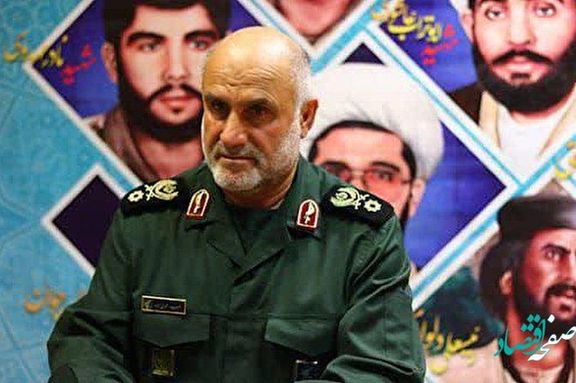
All teachers in Iran should be forced to join the Basij, a leading government official has urged.
The feared militia has launched violent attacks on women and schoolgirls for not wearing hijab.
But speaking on Thursday, Ahmad Mohammadizadeh, the Governor of Bushehr Province in the south, said that there should not be a single teacher in his province who is not in the Basij because the only successful teacher is the one who works with the mindset of the paramilitary force.
The Basij is mostly made up of young volunteers. Its members usually go through limited training to serve as an auxiliary force in local security and enforcing state control over society through suppressing demonstrations and gathering intelligence.
Last year, Iran's Revolutionary Guard (IRGC) announced plans to set up Basij bases in about 11,000 neighborhoods across the country by 2023.
The head of the Basij Organization, under the command of the IRGC, said that there are 50,000 neighborhoods in the country, therefore when the plan – dubbed Islamic neighborhoods – is implemented, Basij will have active presence in about one-fifth of the neighborhoods all over Iran.
In February, Basij plainclothes agents raided a language school detaining two teenage girls who had removed the hijab.
Violence against women, especially teenage girls, due to what the regime calls "improper hijab" has been going on for over four decades. During the uprising of the Iranian people in recent months the violence has intensified with the increase of women's civil disobedience against the mandatory hijab.
The Islamic Republic confronts such civil disobedience with heavy punishment for what it calls "removing hijab".
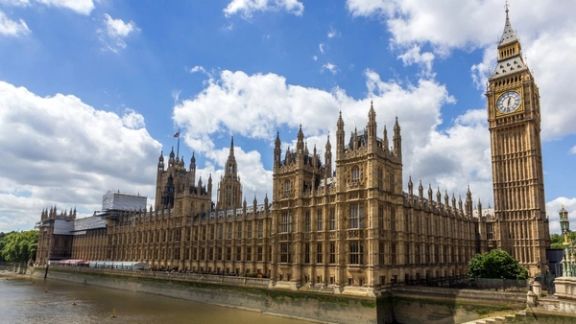
A group of 125 British MPs has signed a letter backing hunger striker Vahid Beheshti’s call for the Islamic Revolutionary Guard Corps (IRGC) to be outlawed.
The group supported the Iranian activist's call for the IRGC to be declared a terrorist organization in a letter they signed and sent to Prime Minister Rishi Sunak.
A group of the MPs backing Beheshti visited him in London on Wednesday as his hunger strike outside the Foreign Office entered its 56th day.
This comes as a series of protests are planned across London this month in support of Beheshti.
“Vahid has shown remarkable dignity and strength throughout his protest and has widespread support from parliamentarians who share his sense of urgency in the need to proscribe the (IRGC) as a terror organization,” read the letter addressed to Prime Minister Rishi Sunak, Foreign Secretary James Cleverly, and Home Secretary Suella Braverman.
“Proscription of the IRGC has deep support across Parliament. MPs unanimously endorsed a motion earlier this year calling for proscription. Peers from all parties and none have also joined the efforts to end the IRGC’s ability to operate in the UK.”
The government's decision to proscribe Hamas and Hezbollah terror groups was also noted by the group as an important step in combating extremism and terrorism, but the UK cannot afford to stop there.
“The IRGC is, after all, the primary financier, supplier, and trainer of these dangerous groups. It is incumbent upon the Government to go after the parent organization,” added the letter.
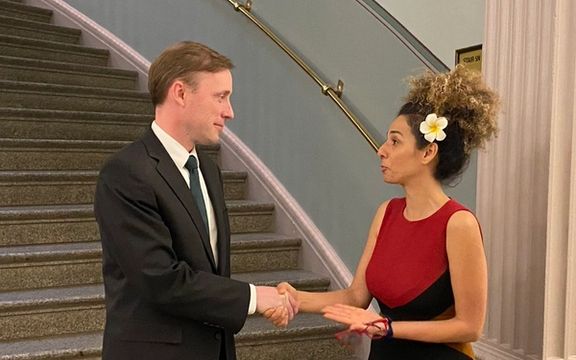
Iran and China are becoming increasingly brazen in their attempts to silence dissidents on American soil and influence US policy, the FBI warned Wednesday.
In a news briefing with reporters about transnational repression, FBI counterintelligence officials urged victims to come forward, saying the bureau is tracking a growing trend of foreign authoritarian regimes breaching US laws to intimidate certain communities.
The officials said the governments have at times resorted to using private investigators to conduct surveillance on dissidents and that several criminal cases have been brought by federal prosecutors involving their use.
The most brazen case of attempts to silence Iranian dissidents were two plots uncovered by US law enforcement against the prominent Iranian dissident and activist Masih Alinejad living in New York City in 2021 and 2022.
The Justice department announced in July 2021 that the FBI had foiled an attempt by Iranian intelligence to kidnap her, although it did not identify her by name. Later, Alinejad told the media that she was the person targeted.
Earlier this month, a federal court in New York sentenced Niloufar Bahadorifar, an Iranian-American woman, who had pleaded guilty in the plot to kidnap Alinejad.
The plan reportedly involved kidnapping her and taking her to Venezuela by speed boat, apparently to be sent back to Iran and executed like other kidnapped dissidents.
"A lot of these are new tactics and lines that are being crossed that we have not seen China and Iran do on US soil in previous investigations," one FBI counterintelligence official said. He added that the FBI hoped to raise awareness of such trends and alert the private investigator sector and state and local law enforcement.
Iranian intelligence extensively operates also in Europe, where serious threats against journalists detected by British police last November led to the temporary closure of Iran International’s London broadcasting center and moving operations to Washington DC.
Officials said the goals of transnational repression schemes are multifaceted, and at times also aim to influence US policy decisions through "malign influence tactics."
"We've really seen an inflection point in the tactics and tools, and the level of risk and the level of threat that have changed over the past few years," another FBI counterintelligence official said.
The call with reporters on Wednesday came just two days after federal agents arrested two New York residents for allegedly operating a Chinese "secret police station" in Manhattan's Chinatown district, in what prosecutors said is part of a broader US government crackdown on Beijing's alleged targeting of dissidents.
Safeguard Defenders, a Europe-based human rights organization, has published reports in recent months revealing the presence of dozens of Chinese police "service stations" in major cities around the world, including in New York and Los Angeles.
FBI officials declined to comment on the New York case or speak about any other open investigations.
Reporting by Reuters